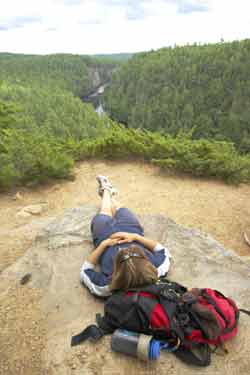Life in the Fast Lane
Work can wait…for a slow vacation

Take a deep breath. It’s summer in the Triangle. Time to slow down.
That is, if you haven’t forgotten how to take a break after running full speed all year and checking off unrelenting to-do lists. U.S. workers receive fewer paid vacation days than Europeans (an average of 8.9 days after one year vs. a minimum of 20 to 25 in the European Union). A third of employed Americans don’t even take all the time off they’re entitled to, a recent survey found. Americans typically leave four days unused, up from three days in the previous year’s “Vacation Deprivation” survey, conducted by Harris Interactive for online travel company Expedia.com.
When they do take time off, about 1 in 4 Americans still check on the office via e-mail or voice mail. With that kind of seepage, no wonder vacation itineraries begin to resemble work agendas, with every minute made to count.
“In our productivity-driven society, we tend to forget that vacation isn’t about output,” says Joe Robinson, a work-life consultant and author of “Work to Live.”
It’s about play and about leaving time for serendipity, he says.
It’s also about health: At least two studies have shown a correlation between the stress reduction of annual vacations and lower rates of coronary heart disease.
“Our bodies are designed to recover; that is basic biology,” points out Wolfgang Linden, psychology professor at the University of British Columbia. “You need a reprieve.”
Though wanderlust may take you around the world, your own backyard can provide respite. “There’s a taboo against slow, that it’s a four-letter word, as opposed to busy, which is a badge of honor,” says Carl Honore, author of “In Praise of Slowness: Challenging the Cult of Speed.” What Honore calls the “slow ethos” does not mean moving at a snail’s pace. Rather, he explains, it’s “doing things as well as possible instead of as fast as possible.”
For example, the following is not relaxing: Penciling in a spa day only to jump from a yoga class to a massage to a facial, and then heading to the airport for a flight spent furiously catching up on a laptop. In life in general, not just on vacation, Honore asserts, “We don’t get the full pleasure because we don’t take time in between activities to decompress, to reflect on and enjoy what we do.”Instead, we become overstimulated and exhausted, even when we think we’re taking time off. The root of the word “vacation” comes from the Latin word for “vacate,” to create a vacuum, teaches stress and mind-body guru Joan Borysenko. “It’s time to empty out, not fill more in,” she says.
Increasing numbers of fast-track women are getting fed up with time-deprived living and are embracing that idea. That’s why the concept of Slow Travel has developed. It’s not just a less hectic vacation; it’s a different style of going on holiday.
“You stay in one place and pretend you live in the area and do all the things the locals do,” explains Pauline Kenny, who founded the Web site SlowTrav.com.
It’s the opposite of what she calls “zoom” travel. That’s the “If it’s Tuesday, this must be Belgium” mode in which you pack and unpack in a different place every day.
Instead, you establish a home base (at a rental, apartment swap, hotel or bed-and-breakfast) for a week or more, and then branch out to explore close-by surroundings.
Like Honore, Kenny emphasizes that globetrotting in the slow lane doesn’t mean driving to a destination under the speed limit. It simply encourages moving at a slow and steady pace that allows you to complete each day feeling refreshed rather than depleted.
“Everyone needs to figure out what they want from a trip, what interests them and make their own ‘must sees,’” Kenny says.
Her list includes taking walks, exploring neighborhoods, buying local produce and experimenting with regional recipes. Yet, even when the sense of quiet is sublime, our internal beeping and blinking often ruins the mood.
Why can’t we just unplug and disconnect?
“Multitasking is endemic to our culture and infects our recreational experiences,” says Jeffrey Kottler, a professor at California State University and author of “Travel That Can Change Your Life.” “It’s not enough, we think, to just be with the family or sit on the beach or hike,” Kottler explains. Even while we are away from work, we measure ourselves by how in demand we are.
“We have a culture of bootstrapped ambition and, often, unacknowledged status anxiety turns even leisure activities into arenas of achievement,” says Tom Lutz, author of “Doing Nothing: A History of Loafers, Loungers, Slacks and Bums in America.”
As painful a blow to the ego as it may be, summer is a good time to challenge the notion that you are indispensable, says psychologist Ellen Ostrow.
“Go someplace so isolated there is no cell service,” she suggests.
If that’s more disconnectedness than you can take, start small. Just leave your calendar at home.
“A vacation shouldn’t be a forced march with a list of five museums, 10 restaurants and three theme parks,” says psychiatrist Edward Hallowell, author of “CrazyBusy: Overstretched, Overbooked and About to Snap!”
“If you don’t take your time, it will be taken from you,” Hallowell warns.